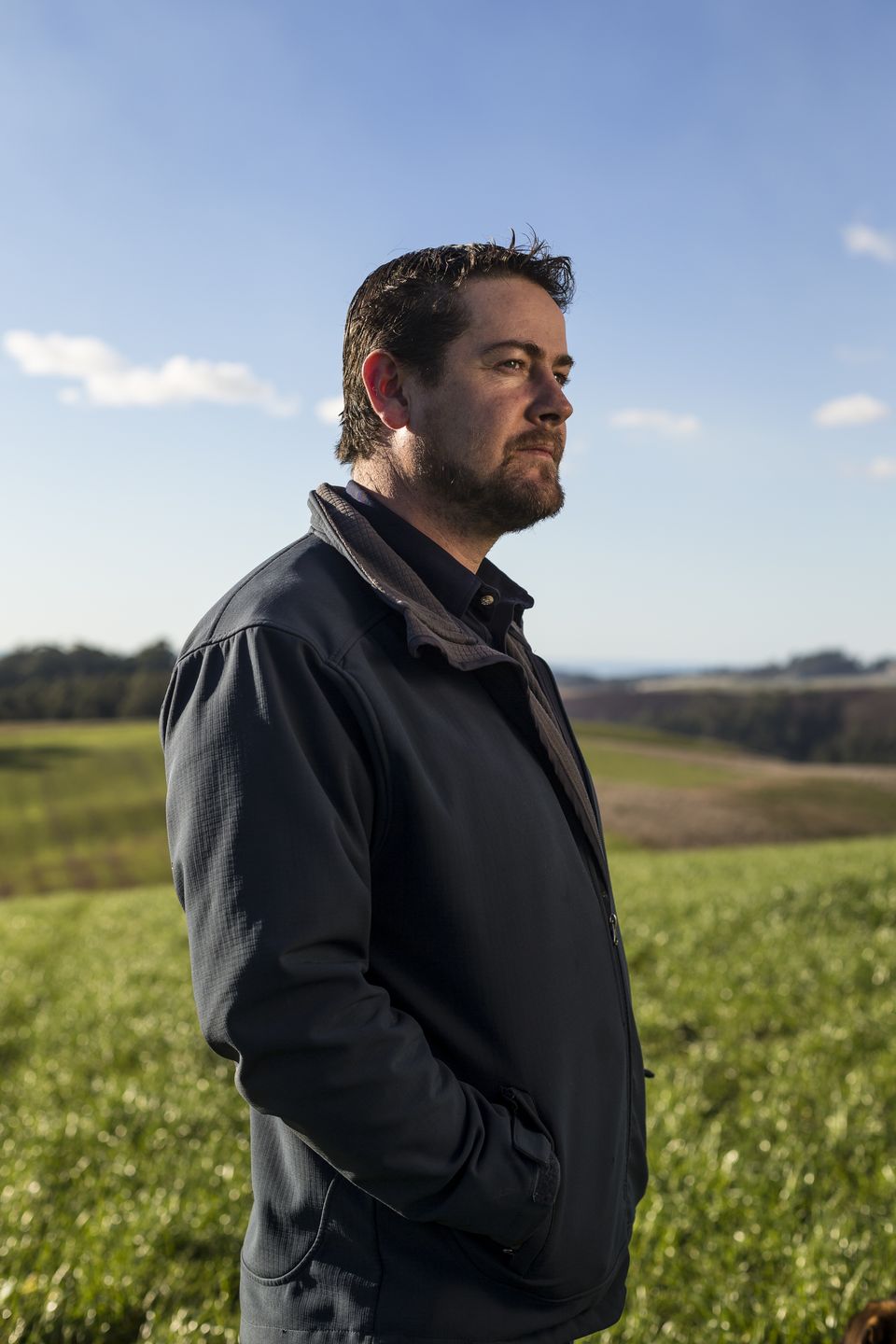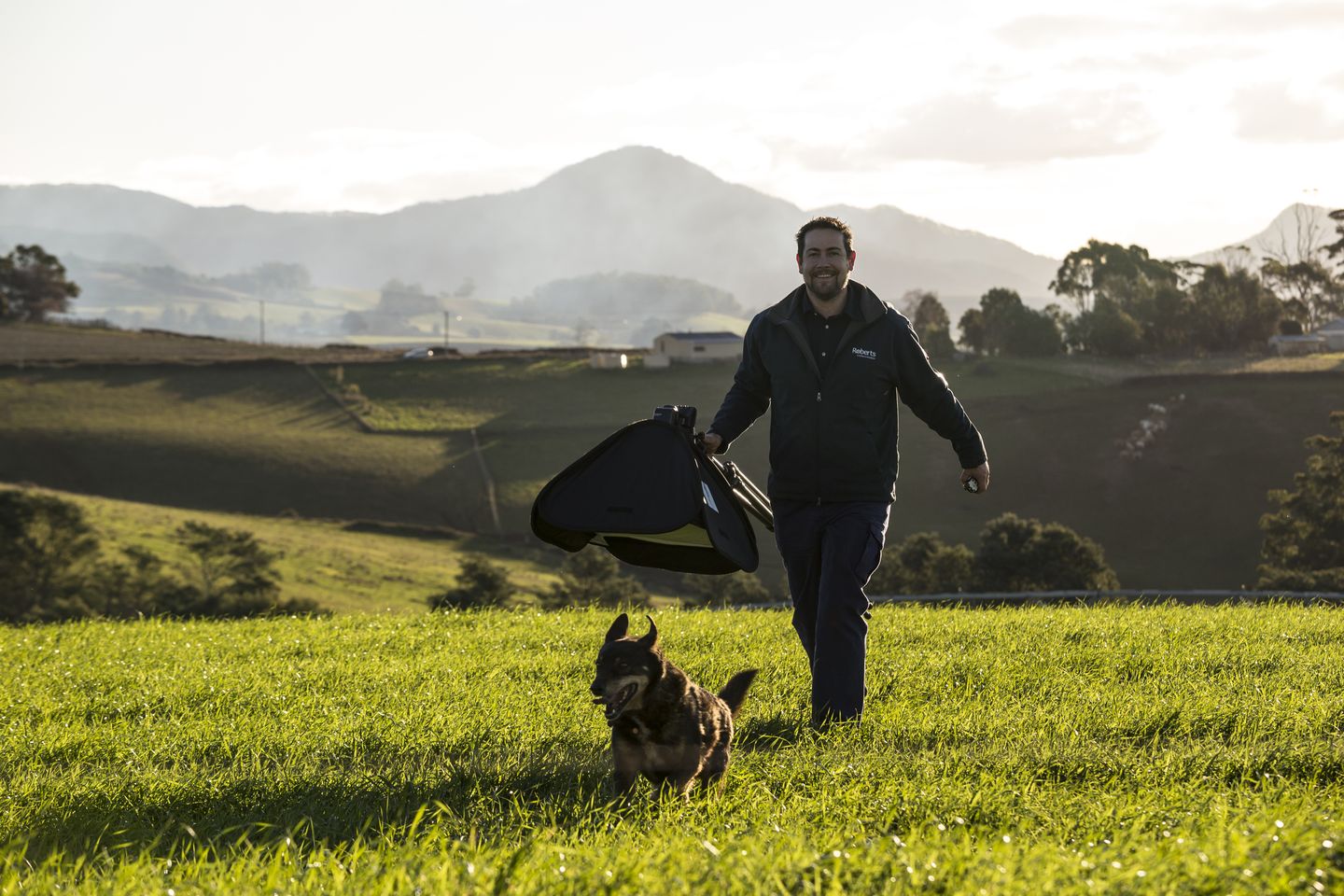Monitoring psyllids and psyllid predators in Australian potato crops
11 August 2017Identify process improvements for preserving peak freshness of broccoli
16 August 2017Tim Walker is a busy man – a father of three children, an agronomist during the day and operator of the family farm after hours and on the weekend. We spoke to Tim about his rise to Senior Sales Agronomist for Tasmanian-based agribusiness Roberts Limited, and how being in this position assists him with his own growing operation.
Fast facts
Name: Tim Walker
Location: Ulverstone and Devonport, TAS
Works: Roberts Limited and Berkshire Downs
Role: Senior Sales Agronomist and Farm Manager
Grows: Potatoes, pyrethrum, poppies and grain
From finishing year 10 one day to beginning a Certificate II in Agriculture the next: that was the beginning of potato grower and Tasmanian agronomist Tim Walker’s journey into the horticulture industry.
During this time, Tim lasted 12 months on a dairy farm as a trainee before deciding that milking cows wasn’t for him. At the tender age of 17, he then went on to complete his Certificate III on a beef, sheep and cropping farm.
By the end of 2009, Tim had completed his Diploma in Agriculture and this led to a role at Field Fresh in Tasmania as a junior agronomist with a focus on carrots and onions. Now 34 and a father of three, he juggles managing the 120-acre family farm based at Ulverstone with a Senior Sales Agronomist role at Roberts Limited in Devonport.
Tim’s career progression over the years has been recognised by the industry, with the grower/agronomist completing the vegetable levy-funded Growing Leaders program in 2011 before being awarded the Rising Star mantle at the 2012 AUSVEG National Convention.
His property, Berkshire Downs, produces 500 tonnes of potatoes a year for McCain, and has been doing this successfully for the past three years.


A burgeoning career
Tim has worked with Roberts for five years as a Senior Sales Agronomist, however his agronomy career was almost over before it began.
“I was a trainee agronomist for Field Fresh, and that learning experience was invaluable for me,” Tim explains.
“I worked there for a couple of years and then I unfortunately got made redundant when they sold their carrot operation to Harvest Moon. I was then fortunate enough to get picked up by Harvest Moon to be their carrot agronomist and it grew from there.”
A couple of years later, Roberts Limited approached Tim.
“I went from being a trainee, worked my way up the ranks and then started with Roberts as a Senior Sales Agronomist, which was a bit daunting – it was a big title to fill but it has gone really well. We do a fair bit of education, training and showcasing new products for everyone. I’m actually in the process of organising a carrot and onion industry forum to educate farmers with the new products coming into the market.”
Tim is at the forefront of all the latest technologies, chemistries and varieties, and is involved in trials with new fungicides and seed varieties. He says this is invaluable when it comes to his own growing operation.
“If I’m unsure about something, or if a new product comes out, I like to see it and have confidence in myself that it works before I go out recommending it. I quite often conduct trials on my place and that’s a massive advantage to me. I’m very lucky to be in that position,” he says.
"You’ve got to move forward and do things more productively. All the little things do add up; you’ve got to have a lot of pride in your work and do things properly."
Weathering challenges
Like all potato growers, the weather is a huge challenge for Tim. The highs and lows can be in stark contrast; for example, 180 millimetres of rain fell onto his farm two seasons ago following a long drought and the warm, wet conditions resulted in rotten potatoes. On the other hand, 2016-17 was a bumper season.
As an agronomist, Tim can relate to his clients and their challenges as well.
“I look after a number of potato crops along the coast of north-west Tasmania and I really enjoy talking to farmers – I can relate to them fairly well and we form quite strong relationships and friendships. I’m learning from them every day as well – that’s what I enjoy the most.
“Weather does influence supply and demand – if there is a wet and warm summer, the disease pressure is a lot higher which leads to increased input costs and premature loss of crops.
“Likewise with insects; cutworms are always an issue, as is potato moth. You’ve got all the elements that you have to deal with.”
Overcoming these challenges is tricky, however Tim’s advice is simple: Plan ahead and get in early.
“It is important to be on the forefront of the new technologies coming through, such as fungicides and monitoring techniques. Prevention is better than a cure, especially with disease and insect pressure – it’s a bit late once your crop has been wiped out. To prevent or minimise the effects of these challenges is to nip them in the bud early if you can.”

Ongoing sustainability
To achieve a balance between work, family and farm life, Tim had to be creative in his approach to maintaining the intensive growing operation and its long-term success.
When the farm was initially purchased, the paddocks were expanded and a portable irrigation pivot was implemented, which slashed the number of days it took to water the property from 32 to just four.
Tim also credits rotation as an important factor in disease resistance as well as sustainability.
“On our farm, we grow potatoes, pyrethrum, poppies, grain and we raise a few beef cattle. We try to have at least a six-year rotation with our potatoes. We’re lucky the farm was taken out of production of potatoes for a while, so it gave it a good rest,” he explains.
According to Tim, the secret to having a successful farm is smart investment.
“We couldn’t be running it how we are now if we hadn’t invested in the irrigation infrastructure. I do all spraying, fertiliser spreading and probably 90 per cent of the groundwork myself now and that makes it profitable. It’s time consuming but it’s more profitable for us.
“My advice would be to keep investing in infrastructure and equipment that makes the farm more manageable and simplifies things. You’ve got to move forward and do things more productively. All the little things do add up; you’ve got to have a lot of pride in your work and do things properly.”
Future plans
Tim is currently in the process of buying Berkshire Downs from his parents. The goal is to expand the farm by increasing the acreage, and build it up to a point where it can be transitioned to his three children.
“The farm is only 120 acres but it’s very intense. We’re getting really good tonnage and yield per acre at the moment and I’d like to triple that in the next 5-10 years,” Tim says.
“I don’t think I could have it much bigger than it is at the moment, but with succession planning and making things simple – you can.”
Despite these ambitions, Tim has no plans to become a full-time grower.
“I wouldn’t want to give up my agronomy position because that is invaluable to my success,” he says.
This grower profile first appeared in the leading magazine for the Australian potato industry, Potatoes Australia. If you’d like to subscribe to receive a new edition of Potatoes Australia in your mailbox every two months, use our online subscription form!
Photography credit: Heath Holden

